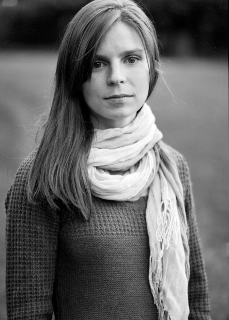
“And What If What’s Beyond This is No Feeling?”
Contributor’s Marginalia: Kjerstin Kauffman on “Eve of the Ascent” by Katy Didden
There’s a moment in “Eve of the Ascent” when the speaker’s thoughts move from Dante’s Purgatory to what’s immediate and in front of her: “Behind gnarly junipers our white tent flaps / in wind that would lift it a mile over the valley / had we not weighed it down with heavy stones.”
It’s a moment that took my breath away. I recognized the associative link between purgatorial soul and white tent, and perhaps also the biblical idea of tent as Tabernacle, the temporary dwelling place of the Most Holy. The poem moves gracefully between high and low registers, inviting us, without ostentation, to think of the speaker’s hiking trip in light of sacred text and epic tradition. But what I thought of first was Frost’s silken tent:
She is as in a field a silken tent
At midday when the sunny summer breeze
Has dried the dew and all its ropes relent,
So that in guys it gently sways at ease,
And its supporting central cedar pole,
That is its pinnacle to heavenward
And signifies the sureness of the soul,
Seems to owe naught to any single cord,
But strictly held by none, is loosely bound
By countless silken ties of love and thought
To every thing on earth the compass round,
And only by one’s going slightly taut
In the capriciousness of summer air
Is of the slightest bondage made aware.
Didden’s “heavy stones” are Frost’s “countless silken ties of love and thought,” the earthly concerns against which the creative spirit strains, the counterbalance to the upward impulse. But where a silken tie is easily unfastened, a stone suggests permanence—millstone, boundary stone, gravestone. And where Frost’s tent seems almost an entity of its own, Didden’s is the object of collective responsibility. We weighed it down by heavy stones. We kept our temporary home intact. We had to, or it would have disappeared.
We is so important for this poem. Fellow hikers, warned of the dangers by guides. The speaker’s “demons / . . . friends I’ve lost to wordless anger.” Other “night-hikers” heading up the Dome. Carol, Carol’s Granny Ray. Michael Wilson. Dante and his penitent souls. Didden speaks eloquently here of the self’s conflicting interests, of—to borrow Larkin’s phrase—the “blent air in which all our compulsions meet.” But hers is no lone tent, decorative, in an empty field. Hers is a self enacted and understood within community—narrowly speaking, the community of friends hiking together, broadly speaking, the community of poets past and present the speaker has connected with through art.
Didden’s poem does, remarkably, achieve ascent, from the “demons” early in the poem to the shudder of mortal consciousness in the middle, to the final “laugh so hard / we cannot breathe.” Frost ends “Silken Tent” on the idea of bondage, but Didden ends “Eve” in a place of unexpected freedom. The “what if” of “what’s after this” is answered, not with a theology of the afterlife, not even, exactly, with the magnificent “nowness” of her experience halfway up the Dome, but with the presence of the people around her. The presiding feeling, in spite of any threat, is a vast, magnetic joy. In the capriciousness of summer air—or of fate—there’s a miracle. The miracle is friends.
